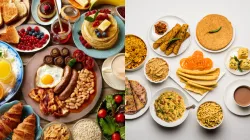Western vs Indian: Which breakfast option is healthier?
The breakfast table can be a battleground between two distinct culinary traditions: the West and India. While both offer a morning kickstart, the nutritional landscape differs significantly. Let's delve into the pros and cons of each.

Breakfast, often hailed as the most important meal of the day, sets the tone for our energy levels, productivity, and overall health. The clash between Western and Indian breakfast choices has sparked debates over which offers superior nutrition. Let's delve into the nutritional merits of each to uncover the healthier option.
Western breakfast:
In the Western world, breakfast staples range from cereal and milk to toast with spreads, bacon, eggs, and pastries. While convenient, many of these options tend to be high in refined carbohydrates, sugars, and saturated fats. Cereals often contain added sugars and lack sufficient fibre, leading to rapid spikes in blood sugar levels followed by crashes, which can leave one feeling sluggish.
However, some Western breakfast items offer nutritional value. Eggs, for example, are a good source of protein, vitamins, and minerals, promoting satiety and muscle repair. Whole-grain toast provides fibre for digestive health, while avocados offer healthy fats and essential nutrients.
Indian breakfast:
Indian breakfasts are as diverse as the country itself, reflecting regional flavours and traditions. Common options include dosa, idli, upma, poha, and paratha, often accompanied by chutneys, sambar, or yoghurt. These dishes are typically rich in complex carbohydrates, fibre, and a variety of spices.
Dosas and idlis, made from fermented rice and lentil batter, are light on the stomach yet packed with essential nutrients and probiotics due to the fermentation process. Upma, made from semolina or broken wheat, offers a good balance of carbohydrates and fibre, providing sustained energy throughout the morning. Poha, flattened rice cooked with vegetables and spices, is light, easily digestible, and nutrient-dense. Parathas, though higher in calories due to the use of whole wheat flour and ghee, can be nutritious when paired with yoghurt and pickles, offering a balance of carbohydrates, protein, and healthy fats.
Which is better?
When comparing Western and Indian breakfast options, it's essential to consider factors such as nutritional composition, impact on blood sugar levels, and overall health benefits. While Western breakfasts may offer convenience and familiarity, they often fall short in providing a balanced array of nutrients, leading to energy crashes and cravings later in the day.
On the other hand, Indian breakfasts emphasise whole grains, legumes, and spices, offering a more diverse range of nutrients and promoting better blood sugar control and digestive health. The inclusion of probiotic-rich fermented foods further enhances gut health, immunity, and nutrient absorption.
In the debate between Western and Indian breakfasts, the latter emerges as the clear winner in terms of nutritional value and health benefits. While Western options may have their place in moderation, incorporating Indian breakfast staples can provide a more balanced and nourishing start to the day. By embracing the diversity of global cuisines and prioritizing nutrient-dense choices, we can optimise our breakfast habits for better health and vitality.
ALSO READ: Eggs vs Nuts: Which is healthier for breakfast